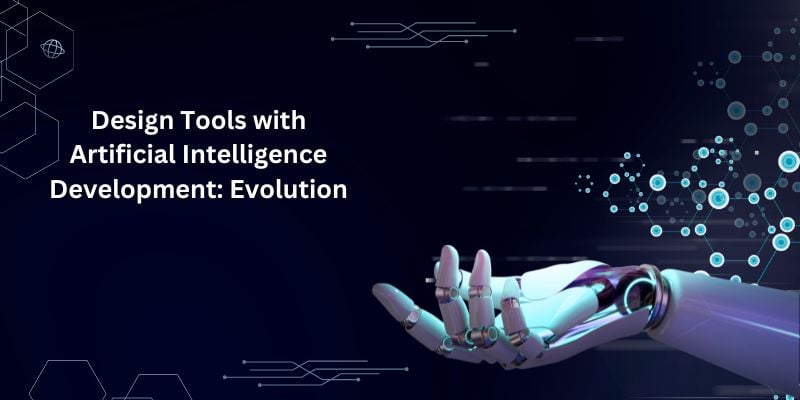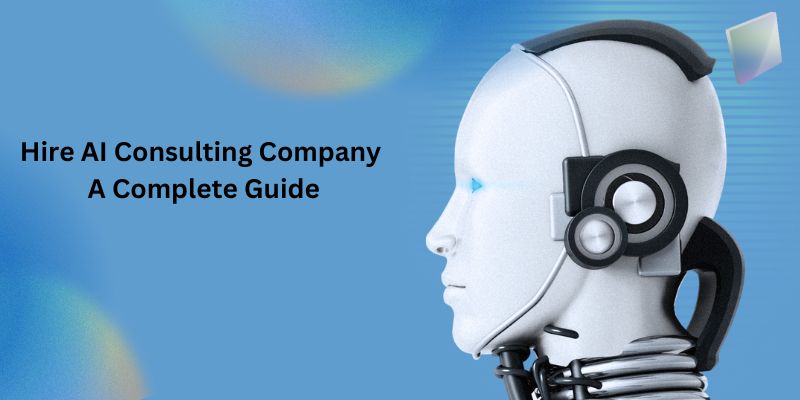Despite the economic imbalance the tech industry has witnessed, 2022 was still the most creative year for the latest artificial intelligence trends. Many tech companies have witnessed significant growth, funding, and innovations in Artificial Intelligence Trends 2023. However, it is also true that most investors are now looking for sustainable and long-term money-making innovations.
Recently, ChatGPT and DALL-E2 created a sensational and groundbreaking entry in the last couple of months of 2022. In 2023, many startups and companies are finding potential in artificial intelligence. Thus, numbers of techies and non-techies will register their companies in 2023.
What is Artificial Intelligence?
“Artificial Intelligence” is a broad term. AI involves computer software that can engage in human-like behavior, from mundane tasks to solving complex problems in milliseconds. AI software has dominated various industrial areas, from agriculture & real estate to hospitality, healthcare, media, banking, education, and more. In contrast to traditional software, AI software possesses several qualities, such as quick decision-making, dissecting and analyzing big data, making better future predictions, etc.
What are the Types of AI?
There are usually four types of AI. Let’s look at them-
1. Reactive Machines
They have the simplest AI structure. Such machines neither have memories nor use past experiences to make current decisions. Therefore, they are limited to one specific task and can not function beyond that. They don’t take part in the world interactively.
2. Limited Memory
Such machines can look into the past and make decisions based on past experiences. For example, self-driving cars work on this concept. However, these machines have limited memory. So, they are not reliable in every situation.
3. Theory of Mind
Such artificial intelligence trends 2023 gain knowledge about the world and its entities. They would understand the mind to some extent and behave accordingly. It includes understanding people, objects, emotions, environments, etc.
4. Self-awareness
It is an advanced stage of AI machines. Where they behave and function as consciously advanced human beings. Such kinds of AI machines can make complex decisions and surpass human intelligence to a large extent.
How Does AI Work?
AI uses algorithms to process large amounts of data to make predictions. The software understands and analyzes data at a very fast processing speed. Some subfields help AI machines make better decisions and predict events more accurately.
Machine Learning
Machine learning is a branch of AI that processes and analyzes a lot of data to make predictions using ML algorithms. The results gain more accuracy after optimizing and evaluating results over time. A typical machine learning algorithm contains a set of neural networks, clusters, logistic and linear regression, decision trees, and more.
Deep Learning
Deep learning uses algorithms for computers to recognize patterns, from everyday tasks to advanced actions, to achieve accuracy and help the machine make better predictions. To do so, it uses multiple sets of datasheets. The machine learning models are of three types- supervised machine learning, unsupervised machine learning, and semi-supervised learning.
Computer Vision
It is a subfield of artificial intelligence which uses digital images, videos, and other visual data to make decisions. It analyzes multiple images over and over again to discern and distinguish. A computer vision algorithm is useful in entertainment, business, healthcare, and transportation. Several electronic devices that use AI include security cameras, smartphones, traffic cameras, etc.
Natural Language Processing (NLP)
NLP is a subfield of artificial intelligence that enables computers to interact with humans using everyday language. It can be text or images, just the way humans communicate. It is most useful in voice-operated GPS networks, speech-to-text operations, digital assistants, chatbots, and other communication services.
Artificial Neural Network (ANN)
ANN, also known as Simulated Neural Network (SNN), has a name and structure similar to biological neural networks in the human brain. They simulate the data using different layers of mathematical processing to interpret data. So computers can understand and learn things. ANN consists of millions of neurons in a computer.
Ethics and Regulations with AI
AI ethics are a set of regulations that help computers discern between right and wrong. It is a set of guidelines that help computers with design and suitable outcomes. In all machine learning algorithms, data is the foundation. Therefore, it’s important to structure the design and algorithm so that its potential to analyze data surpass human capabilities and give the outcome matching all AI ethics guidelines at a faster rate.
Also Read:Benefits of Mobile Application For Your Business in 2023
For the last few years, privacy concerns have been on the rise with the popularity of AI. Data protection, data privacy, and data security is the topic of concern for policymakers with the increase of cyberattacks, hackings, and illegal surveillance incidents. In addition, when the training of the system with data is biased and discriminatory, how can it make unbiased decisions? Thus, guidelines for the code of conduct become necessary to protect people's right to share information and private lives.
Many organizations are working towards implementing ethical AI. They are AlgorithmWatch, AI Now Institute, DARPA (Defence Advanced Research Projects Agency),CHAI (Center for Human-compatible Artificial Intelligence),and NASCAR (National Security Commission on Artificial Intelligence).
AI Trends in 2023 to Watch Out for from Various Industries

AI trends in various industries are set to give the future a new direction. Let’s look at all those trends that are gaining the unusual attention of tech enthusiasts-
AI in Agriculture

The agriculture industry benefits from AI's growth by lessening farmers' workload and improving yield growth.
- To optimize yield efficiency, manage micro and macronutrients in the soil, and monitor crop and soil health using visual sensing AI.
- Observing crop growth using AI within precision agriculture. Computer vision also checks soil texture and structure for the particular crop.
- Diagnosing insects and plant diseases with higher accuracy within milliseconds using image recognition technology.
- Health and activity monitoring of livestock.
- Using machine learning to build robots and perform weed detection and soil moisture content in healthy crops.
- Using drone survey technology to monitor cattle and crops. And after harvesting, AI tools are used for grading.
AI in Education

Providing new learning experiences and better quality education with the help of AI technology is the ultimate goal of introducing AI in the education sector.
- AI systems help meet individual students’ needs and identify their learning styles.
- Better knowledge delivery based on every student’s learning pattern and fair grading system.
- Automation of several management tasks and open access to the learning materials to students.
- Overall school management, including facility management, scheduling, data & learning analytics, student record management, transportation, budgeting, etc.
- Create global classrooms for all who speak different languages or are specially-abled students.
AI in Healthcare

The Healthcare industry has been achieving more success with AI robots and software. Let’s look at its more extensive use in the healthcare industry-
- Detecting potential diseases based on systems using machine learning algorithms and various cognitive analysis features.
- Using deep learning or neural network models to diagnose cancerous cells in radiology images.
- Deep learning is also used with radio mics in oncology-based imaging analysis.
- Better administrative management and increased efficiency using AI software.
- Enhanced healthcare experience by monitoring patient behavior using AI.
- AI can also predict and prevent the spread of potential diseases using data analysis.
AI in Automobiles

The automobile industry is one of the few industries rigorously testing the new possibilities with AI.
- Companies like Waymo, Google, AutoX, and Zoox are working towards launching driverless cars.
- Auto manufacturing robots enhance production using IoT, Machine learning, and AI-powered systems.
- The automotive industry uses AI for driver assistance systems for automatic braking, detecting drivers’ drowsiness, and warning about lane departure.
- Self-driving cars retrieve data from image recognition systems with the help of machine learning and neural network systems.
- Using AI robots from manufacturing to better customer experience and business processing automation.
AI in Gaming

The gaming sector is one of those industries where artificial intelligence has established a prominent value. Now, game developers can create more creative, adaptive, and responsive game characters and storylines through AI. The ultimate goal of using AI in gaming is to immerse the gamer in the game.
Some AI-powered games are Red Dead Redemption 2, Half-Life, Bioshock Infinite, Grand Theft Auto 5, Gothic, Alien: Isolation, FEAR, and Halo: Combat Evolved. The best way to develop an eye-catching and engaging game is Machine Learning. It also depends on the representation of the game's knowledge, storyline, and concept.
AI in Marketing

AI is used in the marketing field in more ways than one. Knowing the target audience, making strong marketing strategies, content generation for campaigns and websites, and in many more ways, AI greatly helps. Therefore, AI helps in bridging the gap between customers and businesses. Data collection, analysis, and strategizing for the next step are done using various AI tools. These tools use machine learning, big data & analytics, and various AI-powered marketing tools.
Though there are many challenges, many marketers still use these tools for establishing marketing goals and implementing them to attract their audiences. In the end, it helps them achieve their business goals.
AI in Finance

AI came in the form of highly evolved technology in the finance sector. Personal banking, online transactions, consumer finances, cybersecurity, and scam & fraudulent detection are some key areas AI has transformed. Other significant changes with AI in finance are-
- Managing complex financial data using ML and quantum technology.
- Leveraging the potential of AI by getting in-depth insights into the money management, contactless banking, and investment sector.
- Combining AI, NLP, and ML to automate financial analysis and deliver a better customer experience with online banking.
- Evaluate large financial data, predict future trends, and help businesses with investment growth charts to strategize the next financial step.
- Improved risk management and assessment, reduced human errors, assessing loan risks in advance.
AI in Chatbots

AI chatbots are all about assessing human queries and providing solutions by analyzing previous data with the help of AI and NLP. Chatbots are a more convenient option to offer a 24/7 communication facility and a better customer experience. People can ask anytime and get instant solutions.
Scripted and conversational AI chatbots are two kinds of chatbots popular in the tech world. While scripted AI chatbots focus on the specific keyword in the query and provide solutions, conversational AI chatbots act more intelligently. The drawback of scripted chatbots is they can lead customers to wrong solutions and frustrations. At the same time, conversational AI chatbots analyze queries based on pre-recorded data and provide answers in the best way possible.
ChatGPT by OpenAI is the perfect example of conversational AI chatbots. It is expected to improve as more user data will be programmed into it over time.
AI in Collaboration with Humans
The way AI is altering the way of doing things and the way things get done. It instills fear in people regarding replacing their jobs. However, AI is more about collaborating with people to augment and complement human capabilities. Humans must play three crucial roles with AI machines. First, train machines to perform a specific task; Second, Explain the outcomes to get desired and unbiased results; and Third, Sustain responsible and ethical use of AI machines and prevent harm.
Human-Machine collaboration has enabled companies to interact with employees who can not be present via virtual meetings. A virtual assistant can interact with many customers at once. A Swedish bank, SEB, uses Aida, a virtual assistant, to reach its target audiences. Such human-machine interaction offers flexibility, ease of doing business, speed, the ability to upscale business models, personalization, better decision-making opportunities, and more.
AI’s Democratization
AI democratization refers to making AI tools more accessible and easily affordable to people. As AI continues to evolve and improve over time, it has expanded its horizon from improving healthcare systems to advancing scientific research to automating mundane tasks. With democratization, more people are coming forward with new inventions. Many AI tools have enabled people to build software with no-code techniques. Such open-source AI tools, such as GitHub, are accessible to all.
Before making the AI software accessible to all, the company needs to decide on its target audience. Some AI tools are useful for casual users, some have the expertise and experience to use intermediate-level software for various technological solutions, and the rest are developers who specialize in developing new technologies.
AI for Cybersecurity

Cybersecurity has been a major concern when it comes to data security. New AI tools not only prevent malicious attacks but also recognize patterns, improve the outcomes over time using deep learning, and detect & block the attacks earlier. Thus, many companies are working towards advanced data protection techniques. Neural networks and deep learning play a key role in detecting fraud worldwide. Defense, high-tech firms, and government agencies are the key sectors most affected by cyberattacks. Thus, the AI system is useful in pinpointing the vulnerable aspects of a computer system and performing a secure analysis.
The global market for AI cybersecurity was worth $17.4 billion in 2022. It is estimated to reach $102.78 billion by 2032, with a CAGR of 19.43% between 2023 and 2032. In addition, in 2022, North America had the most revenue share of around 38%.
AI for Business Processing
For better optimization of business processing and progress, AI tools are used. For example, Amazon has been using machine learning and deep learning to give satisfactory experiences to its users by learning their behavior. The top-most usage of AI in business includes process automation, cognitive insights & engagement, optimization, and more. The business has been using AI machines for manufacturing, automatic content generation, recruitment, and security purposes. It leads to better financial management, finding cost-effective solutions, getting predictable analysis, and improving decision-making capabilities. Therefore, AI improves the efficiency and growth rate of an organization.
Also Read:How To Shape Your Business With On-Demand Apps?
Here, you have learned about the most trendy areas where AI’s impact is wild. The future of AI looks bright and full of innovative solutions in every field.
Conclusion
Developing AI solutions aims to serve and generate more business revenues. Data scientists and developers have been working on innovating new AI software. Whether you are tech-savvy or not, AI is going to stay around for a long time. Although, many people are skeptical of its interference with human lives. Still, it is undeniable that AI will generate new jobs in numerous fields. Therefore, people must be well prepared to accept AI dominance for a better future and a new way of life.
Frequently Asked Questions
Q1- What is the latest AI software in various fields?
Content DNA, Jupyter notebooks, Google Cloud AI, Infosys nia, Observe.ai, C3 AI, etc., are some futuristic AI software striving to change the game.
Q2- How will AI benefit society?
As per the reports, AI has transformed how people do their jobs. In addition, it will surely generate new and unique money-making and creative job opportunities. As a result, it will open the doors to new ways of servicing society and addressing its issues in the global platform.
Q3- What are the key benefits of business process automation?
The key benefits of business process automation include better collaboration, greater operational efficiency, enhanced service delivery, budget-friendly solutions, better transparency, improved morale, etc.
Q4- What are the most current uses of AI?
Recently, AI has been used in Chatbots, autonomous flying, retail, fashion, surveillance, inventory management, warehousing, logistics, imaging analysis, etc.








